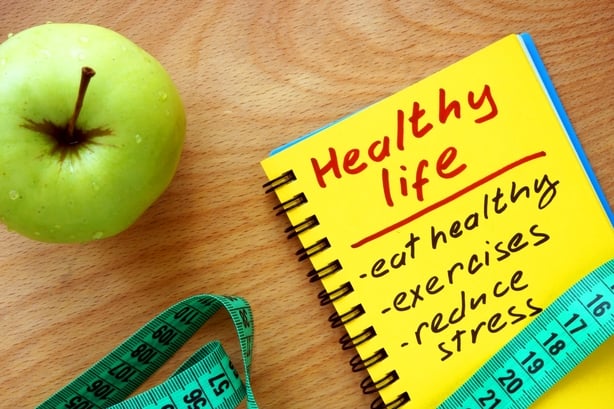It’s something us Irish say all the time as we bid someone farewell: mind yourself.
How lucky we are to live in a society where, by-and-large, our friends and acquaintances are so considerate that reminding someone to ‘mind themselves’ is a standard sign-off! The same can be said of that other stalwart phrase, ‘take care’.
But how many of us actually take heed of this well-intended advice? Or even stop for a minute to consider its intent.
As a race of people, we are excellent at deference. We are kind, compassionate and fiercely loyal. Just not always to ourselves.
Today begins World Mental Health Week, and this fantastic global initiative will see media, community groups, healthcare organisations and companies worldwide highlight the importance of maintaining good mental health and encouraging you to watch out for signs of poor mental health in family, friends, co-workers and classmates.
Just last week, Mental Health First Aid Ireland (MHFA Ireland), which we have been keeping tabs on at RTÉ Lifestyle, launched its specially-tailored programme to teach individuals and organisations in Ireland how to recognise the signs of mental illness and, crucially, what to do to help someone in distress. It’s a really practical, hands-on initiative that gives tangible advice about how you can help.

But, just for today, to kick off World Mental Health Week, how about paying some attention to number one: you. It may feel unnatural ('Paying attention to my feelings? Caring about myself? How American!') but just indulge me for a minute. Anyway, if you can’t take care of yourself, how are you supposed to be a World Mental Health Week warrior and help others who might need it? Below are seven tips for giving yourself a mental NCT. Why not try one a day, for the next seven days, and see how much more in tune with yourself you feel at the end of World Mental Health Week.
I feel the need to include the caveat now that I am not a doctor, psychologist, health care worker or otherwise; my tips and tricks on minding yourself are based on personal experience and years of receiving solid expert advice.
However, if you feel that you might have issues with your mental health that go beyond the scope of what might be considered ‘normal’ (I know, I hate that word too), the best thing you can do is talk to someone and ask for help: a trusted family member or friend, your GP, or a dedicated helpline such as The Samaritans or Aware (details below) are all a good place to start.
7 Ways to Mind Yourself
1. Check in with yourself
We all live such hectic lives now, with omnipresent distractions, that it’s easy to go whole days without really stopping to see how we’re doing. Commit to taking half an hour all to yourself today. Sit down somewhere quiet and comfortable with a cup of coffee, a pen and paper, turn off your phone and take the time to pay attention to how you’re feeling. If it helps, write down anything that occurs to you, so that you can really get a sense of how you are. Note that this session is not to force yourself into feeling happy it’s to take time out to gauge how you’re really feeling so that you can address any personal issues that need to be tended to, or just take time to appreciate how content you are.
2. Review what you chew
You’ve heard it before but it’s too important to overlook: you are what you eat. Nobody’s saying you can’t have a little of what you fancy, but if you’re eating a pastry with your coffee every morning or drinking a two litre bottle of cola every day, it’s time to take an honest look at what you’re eating and drinking and ask yourself what effect its having on your mental health, not just your waistline. Today, take the time to keep a food diary. There are some great apps that will help you measure your intake of protein, carbohydrates, fats, etc., I like ‘My Plate’ for iOS, but there are tonnes of them out there; you could, of course, use a good old-fashioned notebook!
3. Reconnect with your people
Us humans, we’re sociable creatures. Isolation and loneliness breed unhappiness and oftentimes these things can be products of our own design. I think a lot of us can be guilty of neglecting some of our most important relationships out of comfort; you know you’re there for each other so there’s no real need to prioritise them. Whether it’s your partner, family or closest friends, make a commitment to really appreciate the connection you have with the special people in your life. Send a text or a card, drop in for a cup of tea, invite them over for dinner, plan a night out, go for a walk together… remember why you love spending time with your people. I know I said these tips are all about you taking care of you, but just to briefly note that isolation and loneliness can be a real problem for older people and people living alone in rural areas, so keep that in mind this week and take five minutes to call on a neighbour or elderly relative. They’ll probably appreciate it more than they let on.
4. Train your brain
Mindfulness meditation is having a moment, but a lot of people still associate the word ‘meditation’ with the transcendental style that swept the globe in the 60s and 70s. Mindfulness, on the other hand, isn’t about ‘transcending’ to another plane at all, rather its about living in the moment, cherishing the here and now. Whichever form of meditation you go for, it’s the number one tip I would give anyone struggling with any type of mental unrest. Believe me, I’m a natural cynic, and it took me a while to get on board with mindfulness. It’s not a quick fix, either, you really have to work at it in the same way that you have to work at your physical health if you want to reap the rewards. To get a feel for mindfulness and what it’s all about, my advise is to check out the Headspace app for iOS and Android, any of Jon Kabat-Zinn’s videos on You Tube and journalist-turned-mindfulness guru Padraig O'Morain's website (his ‘daily bell’ email gives great pause for thought).

5. Know your crutches
Few of us are saints and if you’re like me you love nothing more than a glass of wine and a bar of chocolate to end the week with. As with food, there’s nothing wrong a with drink every now and then (assuming you’re over 18. Before that age neither your body nor your brain are equipped to deal with the effects of alcohol). But if you find yourself relying on alcohol or drugs to relax, get you through social situations, sleep, enjoy yourself… in other words, if you need them as a crutch, it might be time to look at the possibility that you are more reliant on your relaxant than you think. Today, try to go without alcohol and think about cutting down in general. Alcohol is a natural depressant and never does your mental health any good in the long term, no matter how enjoyable it is at the time. If you find it difficult to go a few days without a drink, talk to someone about it. If you’re relying on prescription or recreational drugs to get you through, again, use this week to recognise that not only might you be using these crutches to cover up an underlying problem, but you are putting your mental and physical health at serious risk in the process.
6. Take a self-care day
OK, this one is at your discretion - use only when needed! When we get sick - say a bad head cold or a persistent headache - we don’t always need to go to the doctor or take prescription medication, but most of us will listen to our bodies and know that we need a day or two in bed if we want to be fit and well enough to carry on with our day-to-day lives. So why is it that so many of us ignore the same signal when it originates from our brain, rather than our bodies? Repeat after me: Mental stress or fatigue is a legitimate reason to ring in sick. Now, I’m not suggesting that you call in sick if you’ve had a particularly vicious morning row with your mobile phone provider or you stayed up too late binge-watching House of Cards, but if you genuinely feel so stressed out that you won’t possibly be able to concentrate or be in any way productive, or worse, that you might snap at a colleague or behave inappropriately due to stress, then its perfectly acceptable to call in sick and spend that day getting yourself right. It’s important to take this day for you, though. Send the kids to school as usual, cancel any unnecessary phone calls or meetings, put off chores and errands… use it to recuperate.
7. Do what you love
Not everybody has the luxury of doing what they love for a living. If you’re one of the lucky ones who does, pause to appreciate it. If you’re part of the majority, however, who hasn’t yet reached dream job status, make today about figuring out how to spend more time doing the things that make you happy. If that’s work-related, jot down some achievable goals that will help you move forward towards something you find rewarding. The average full-timer spends about a third of their life at work, so it’s worth setting aside the time to examine how you can make your work life as fulfilling as possible. If you work from home or are unable to work for any reason, set some goals that will help you enjoy your life more fully, whether it’s taking up a new hobby you’ve always been interested in, starting a blog, learning a language or volunteering for a charity you care about. You’ll feel infinitely better when you’ve got a ‘purpose’ to work towards.



